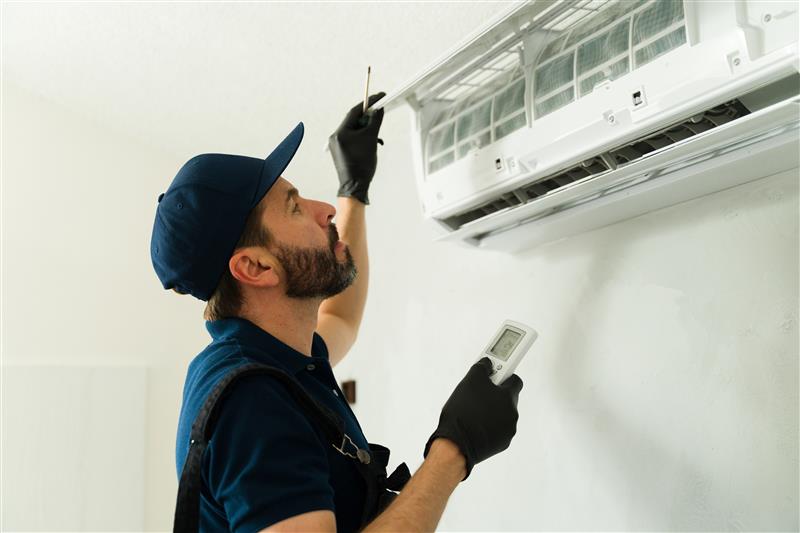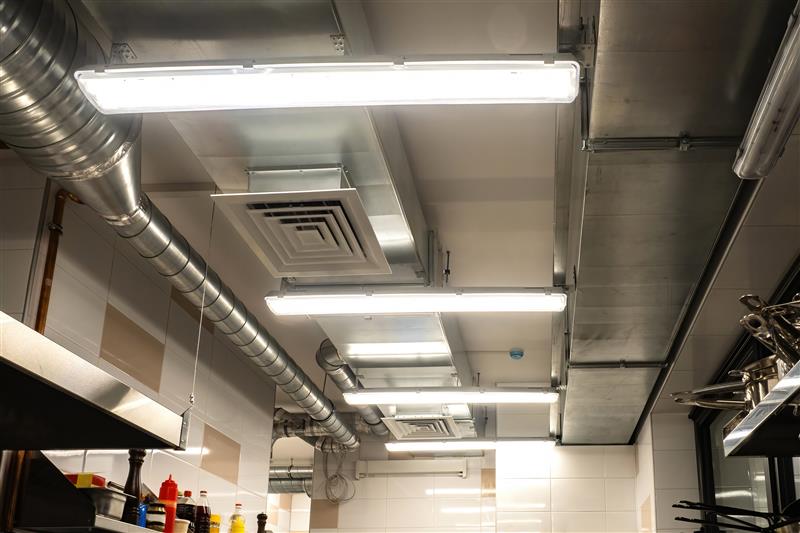In summer, when the temperature increases, an air conditioning system is necessary to stay comfortable. However, just as with any other household device, an air conditioner is subject to problems over time. People often miss a lot of early warning signs of trouble, and this frequently results in costly repairs and even system failures. Being aware of these red flags and taking measures to address them in time will save time and money on the one hand and hassle on the other. This article discusses the importance of early detection and identification of air conditioning problems and how these problems can be resolved.
Why Early Detection Matters
Air conditioning systems are designed to be long-lasting, but they are also subject to wear and tear. The issues, which can be simple, like a filthy filter or a weird noise, may not initially appear dangerous. Yet, neglecting them may lead to a lack of efficiency, increased power bills, or even the overall system failure. These issues are easier to diagnose early, which keeps performance on schedule and allows the unit to have a longer lifespan and prevents emergency fixes in the busy seasons.
Common Early Signs of Air Conditioning Issues
To prevent long-term damage, it is important to identify the early symptoms of faults in Air conditioning. The following are some of the most frequent symptoms that can make you realise that your unit requires attention.
Inconsistent Cooling
When the room appears cooler than others or the system is ineffective in maintaining accurate and stable temperature, it may be a result of airflow or perhaps a case of an incorrect thermostat. This discrepancy may prove to be a burden on the system as well as cost more energy.
Unusual Noises
In general, air conditioners work silently. When the unit begins to sound like it is grinding, squealing or banging, then these are some of the indicators that there might be some mechanical problems inside. Such noises may be associated with the faulty belts, rattling, or parts or motor issues that should never be overlooked.
Weak Airflow
When the air in the vents is weak or just a little detectable, this may have happened as a result of a blocked air filter, broken ductwork work or a bad compressor. This has a bearing on cooling efficiency, and the overall system works hard, resulting in possible breakdowns.
Frequent Cycling
The air conditioners normally turn on and off to facilitate specific temperatures. Nevertheless, when the unit switches on or off more often than the optimal, it may indicate thermostat issues, low refrigerant or a lack of proper size of the unit.
Unpleasant Odours
The smells of mould, burnt out wiring, or debris accumulation can be described as musty or burning and can be emitted through the air conditioner. These odours not only cause problems concerning the quality of air, but also signal health and safety issues.
Higher Energy Bills
The absence of a clear explanation of an increase in the cost of energy is a clear indication of inefficiency in the system. In a case where parts like filters, coils, or motors are not operating accurately, the unit consumes excessive power to obtain the output they are required.

Causes Behind Common Air Conditioning Problems
Dirty or Clogged Filters
Airflow is prohibited when filters are obstructed with dust or rubbish. This makes the system strain and less efficient, leading to ineffective cooling, and the risk of malfunction due to frozen coils or overheating of parts should it not be cleaned.
Low Refrigerant Levels
Air conditioners require a certain level of refrigerant to be able to work. Leaks or deficient refrigerant do not allow efficient recovery of the heat, thereby leading to less-efficient cooling and delays in the cycle power and even compressor damage. Failure to pay attention to this matter may lead to the overall failure of the systems in the long run.
Thermostat Malfunctions
The erroneous thermostat can either get the temperature settings wrong or become unable to communicate with the AC. The result is unpredictable cooling times and short cooling, causing frequent short cycling or wild indoor temperature swings, making the system use more energy, and leading to discomfort.
Frozen Evaporator Coils
Restricted airflow or low refrigerant are the most common causes of frozen coils. The buildup of ice in the coil fails to allow absorption of heat to the coil, which results in poor cooling, warm air coming through the vents, and may also result in compressor failure unless rectified in time.
Leaky Ductwork
Ductwork with holes, cracks, or loose joints will result in a loss of conditioned air into the ceilings or the walls. This waste impedes the efficiency of the system, makes the unit run for a longer time and leads to fluctuating temperatures in your business or house.
When to Call a Professional Technician
Persistent Noises or Vibrations
When you notice that your system starts to produce sounds like grinding, buzzing, or banging, it most likely means that there is internal damage or that the components are worn out. It is important to call a technician for professional Air Conditioner Repair, because additional damage might be averted and even save money on expensive repairs or even complete failure of a system in the future.
Sudden Loss of Cooling
Other major problems with the air conditioner, such as leaks, electrical problems, and faults with the compressor, may be indicated when the air conditioner fails to blow cold air or respond to setting changes. The cause should be determined by an experienced technician who can inspect that part.
Water Leaks Around the Unit
Pools of water around your indoor unit will indicate that a layer of drain line or frost on the coil is blocked. In untreated conditions, it may result in water damage or mould growth. A professional ought to check the pipes, unplug them, and place them back into acceptable drainage.
Constant Thermostat Adjustments
In the event that you keep fiddling with the thermostat but can’t hold the temperature, either your thermostat might be broken, or there is a deeper system problem. A technician is able to recalibrate or exchange parts to bring about optimal performance and comfort.
Preventive Maintenance Tips to Avoid Costly Repairs
Change Air Filters Monthly
Changing air filters is one of the most straightforward but most valuable maintenance steps. Changing them at the end of each month in times of high use will mean the air will have its way through, and there will not be an overload on the system.
Clean the Outdoor Unit
The condenser unit, which is placed outdoors, receives the dust, leaves, and debris over time. Periodic cleaning is required as this will promote heat exchange that can lead to high efficiency of the system.
Schedule Seasonal Servicing
Before the cooling season, professional checks are best done so that the problem can be discovered early. A professional technician is able to inspect the amount of refrigerant in the machine, clean the inner parts, and make sure everything is operating great.
Seal Leaky Windows and Ducts
Air escaping through windows or ducts causes the air conditioner to work harder. By sealing these leaks, indoor temperatures are easier to manage, and energy usage is less.
Keep Thermostat Settings Consistent
Drastic and unexpected variations of thermostat settings compel the unit to keep adjusting itself. Keeping it at the same level keeps you comfortable and efficient.
How Early Action Can Save Money
Disregarding smaller defects would most often lead to increased long-term expenditures. A timely repair and early identification not only eliminates total breakdown of the system, but also help to reduce energy expenses, provide long life to the equipment, and maintain indoor comfort. An efficiently running system consumes less power, needs fewer repairs, and functions in an optimum manner.
Timely repairs also prevent any damage to the inner parts. Capacitor replacement is a lot cheaper compared to replacing the whole compressor. Similarly, it is cheaper to seal a minor refrigerant leak than to repair a burned-out motor, which is a result of overuse.
Is DIY Troubleshooting Safe?
Simple maintenance tasks, including changing filters or cleaning vents, can also be done by business owners. Nevertheless, inadequate knowledge and equipment may be dangerous when trying to make complicated repairs and may also void a warranty. Refrigerant lines, internal mechanics, and electrical parts are only to be touched by trained personnel. When you are not certain about what causes a problem, it is always better and economical to seek the help of a qualified technician.
Conclusion
Early detection of air conditioning problems can save a lot of money as well as discomfort. Although at first, some signs of failure might appear to be insignificant, they usually signal other underlying issues that, without proper treatment, can result in significant failures in the system. Being alert, conducting a routine check-up, and monitoring when to call an expert will help keep your air conditioning system efficient, safe, and reliable at all times. The trick is to act as soon as you notice trouble on the horizon, and this will prevent unscheduled breakdowns and costly repairs.

Frequently Asked Questions
What are the first signs of a failing air conditioner?
Typical symptoms include constant cooling, strange noises, bad airflow, as well as unexpected spikes in the energy expenses of the aircon system.
Can dirty air filters damage my air conditioning system?
Blocked filters indeed limit the free movement of air, and this may lead to overheating, freezing of the coils, and long-term destruction of internal parts.
How often should I have my air conditioner serviced?
It’s recommended to schedule professional servicing at least once a year, ideally before the summer season begins.
Is it safe to repair an air conditioner myself?
Simple tasks like cleaning or replacing filters are safe. However, electrical or refrigerant-related issues should only be handled by professionals.
Why is my air conditioner making a buzzing noise?
The sources of buzzing noise may be electrical issues, loose components, or a compressor malfunction, and must be inspected by a service expert.







